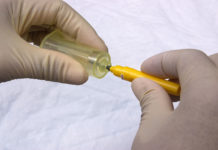
An experimental drug, Rapastinel reverses signs of opioid withdrawal with no side effects
New research shows that an experimental drug originally developed as an antidepressant, substantially reversed acute signs of opioid withdrawal in rats in just three days.
The abuse of and addiction to opioids such as heroin, morphine, and prescription pain relievers is a serious global health problem. According to the National Institute on Drug Abuse (NIDA), it is estimated that between 26.4 million and 36 million people abuse opioids worldwide.
Opioid withdrawal symptoms may range from mild to severe including anxiety, nausea, vomiting, crampy abdominal pain, diarrhoea, muscle aches, sweating, dilated pupil or watery eyes, fast heart rate, excessive yawning, goosebumps, insomnia, depression or aggression, trouble falling and staying asleep or tremor.
“Rapastinel research for opioid dependency is currently only being done in rodents, but if the drug continues to have successful trials, it may enter clinical trials for use in humans”
While medicines are available to relieve withdrawal symptoms in people recovering from opioid addiction, they cause side effects and can maintain the brain changes that led to addiction in the first place, which can lead to relapse before treatment is completed.
“We have found that rapastinel has potential as a new treatment for opioid dependence, as it is effective in reducing withdrawal signs and has not been shown to produce any negative side effects,” said Julia Ferrante, an undergraduate at Villanova University who conducted the research with Cynthia M. Kuhn, PhD, professor of pharmacology and cancer biology at Duke University.
The research will be presented at the American Society for Pharmacology and Experimental Therapeutics annual meeting during the 2019 Experimental Biology meeting in Orlando, Fla.
Buprenorphine and methadone, the most common drugs used to help people quit opioid abuse, are problematic because they are themselves opioids and can be addictive, have unpleasant and sometimes dangerous side effects and often must be used for months to avoid relapse. Ketamine, which has been proposed as an alternative, non-opioid treatment for opioid withdrawal, also has the potential for abuse and can cause hallucinations and other negative side effects.
Rapastinel binds to the same receptor as ketamine but at a different site, where it has a milder effect.
In this study, researchers modeled opioid dependence in rats and then tracked signs of withdrawal in groups of rats given either rapastinel, ketamine or a saline solution. On the third day, rats given rapastinel showed significantly fewer signs of withdrawal than rats given either ketamine or saline, which showed roughly equal amounts of withdrawal signs.
“Rapastinel research for opioid dependency is currently only being done in rodents, but if the drug continues to have successful trials, it may enter clinical trials for use in humans,” Ferrante added.













[…] Read More […]
[…] New drug could reverse heroin, morphine withdrawal symptoms Medibulletin […]
[…] (adsbygoogle = window.adsbygoogle || []).push({}); Source link […]
Comments are closed.